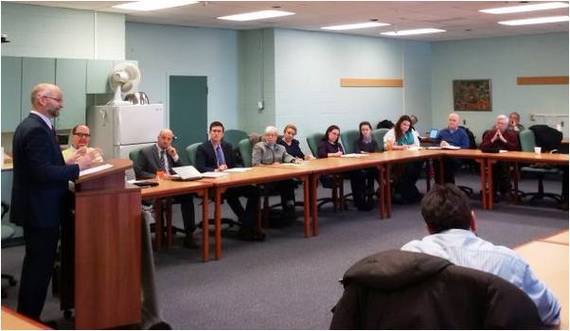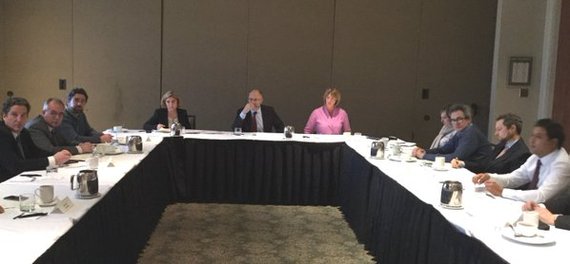Like this article? rabble is reader-supported journalism. Chip in to keep stories like these coming.
On the Trans-Pacific Partnership (TPP), International Trade minister Chrystia Freeland has claimed to be in “listening mode.” And she says no decision has been made yet. It is widely reported that she is touring the country to hear Canadians on the TPP.
In February, during question period in the House of Commons, she said:
“Mr. Speaker, on the TPP, we are doing exactly what we promised we would do during the election campaign. We told Canadians that we would take the time to listen to Canadians and to consult widely on this deal. I myself have been part of more than 50 consultations, and our whole-of-government approach has included more than 200.”
But it is not clear whom she is actually consulting. From our experience, it has been the usual blue-chip industry reps, chamber of commerce boards, and lawyers and academics — not you or me.
Here’s the recipe for a government consultation: first of all, the consultations are by invitation only. A select group of industry representatives or university professors are invited. No one else in the local community knows about it.
The night before, through snooping, we get a notice that either Chrystia Freeland or her sidekick, Parliamentary Secretary David Lametti, will be doing a press conference, generally at a university the next morning following their consultations. At the actual event, there will be a small boardroom full of people. Sometimes, there are more when they stack the room with university students.
There, a panel of experts talk about the TPP’s benefits. Then, there is a short question-and-answer period, where no one actually answers any questions. There is no record of the questions, and no report, as far as we can see. Only after the event does the government put up pictures of the “public consultation.”
Here are some of the highlights of the open consultations:
Vancouver, January 13: The event was billed as “part of a national consultation tour.” Panellists included John Ries, a professor of business economics at the Sauder School of Business, Matilde Bombardini, a professor at the Vancouver School of Economics, and moderator Yves Tiberghien, director of the Institute of Asian Research. Unfortunately, as our chapter activist Tilby notes, “All the panellists minimized the impact of the investor-state dispute settlement (ISDS) provision and made little or no reference to the impact on our democracy.” Nor did Freeland appear to see ISDS as a major issue. Meghan Sali from Open Media noted that six people were allowed to ask questions. None were answered.
Quebec City, January 18, and Halifax, January 20: For Quebec City, we heard about the event hours before. For Halifax, we got a notice the night before that they would be consulting the Halifax Port Authority. We were unable to attend.
Montreal, January 14: The notice was surprisingly long: three whole days in advance! There was a panel of three academics: Vincent Arel-Bundock, Cléo Paskal and Krzysztof Pelc. Only a few questions from the audience. No responses. Many students in the room. I snuck in a question about how this deal was created in secret between the plutocrats of the world, and how could Freeland reconcile this with her writing on inequality. We are all waiting for the answer.
Regina, January 21: Again, this was an event that received less than 24 hours’ notice, as noted by Council of Canadians member Jim Elliot in the Regina Leader Post and the Regina CTV.

“Consultations” in Regina
Winnipeg, January 22: Just the next day, again, with less than 24 hours’ notice, they had another “public consultation.” Our Prairies organizer, Brigette Depape, and activist Jobb Arnold managed to have a conversation with Parliamentary Secretary David Lametti.
St. John’s, March 16: In this case, it seems that some activists were able to get invitations through the Harris Centre. But apparently, no mainstream media showed up, as these tweets show.

“Consultations” in St. John’s
Guelph, March 17: Again, the night before. Mostly people in from the agri-business sector attended. Participants were predominately private sector, with a few public servants and one small NGO. Our activists were able to crash the event, and invited Lametti to their town hall on the TPP.
So now, we find ourselves asking questions aloud about these consultations.
Why are we getting notice only a day before? According to the Independent, Lametti says, “We can’t plan that far in advance… We’re all members of Parliament as well. So because we are sitting, often times the trips are organized, as I said, relatively quickly and it’s hard to plan.”
Are they a smoke screen? Why only industry reps, and not citizens? Given that the corporate sector gets consulted first, does that not set the tone for the rest of the consultations?
Now, it is still not too late to have proper consultations. We hear that the House of Commons Standing Committee on International Trade, a cross-party committee, will be holding hearings in Saskatoon, Calgary, Vancouver and Winnipeg. And that Lametti will be doing his own consulting in Fredericton on March 30 and in P.E.I. on March 31. P.E.I. will be hosting a rally.
But the Committee’s press release says, “The Committee’s primary objective is to assess the extent to which the agreement, once implemented, would be in the best interests of Canadians.” Does that mean the government has made up its mind?
It is well documented that, for years, corporate lobbyists have had their hands over it, in private. Surely, now, we get to have good look at it: civil society, unions, First Nations, municipalities and provinces.
We at the Council of Canadians have also been asking for full consultations, an independent analysis by the Parliamentary Budget Officer and also analysis that would include impacts on the environment and human rights. It is not enough to put up 6,000 pages of legal text or get department cheerleaders to brag about it. We need to have an impact analysis from independent sources so we can weigh the pros and cons of the agreement.
In the meantime, we will be consulting you. And we will let the government hear your opinion. With Open Media and other groups, we are participating in a creating a tool that will send your comments to the Parliamentary Committee on Trade and to your MP. We will also keep your comments online so that we also can keep track of your comments.
Use the tool to send your comments, or sign this petition, register for the committee on trade’s process and talk to your local MP: many all over the world have questions about how the deal damages our public interest, the environment, health care and our democracy. We are more numerous, and we deserve a hearing.
Photos: Global Affairs Canada website
Originally published in The Huffington Post.
Like this article? rabble is reader-supported journalism. Chip in to keep stories like these coming.



